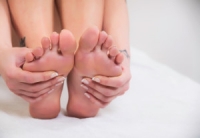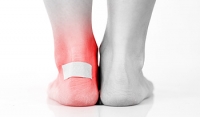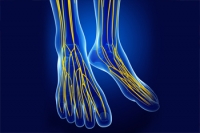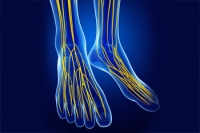
Blog (787)
Strengthening Flat Feet
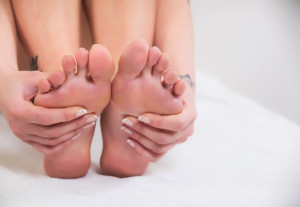 Flat feet often don’t cause any symptoms, however, they can make you more likely to develop foot problems over time. If you want to keep your feet healthy and in good condition, there are many stretching and strengthening exercises that you can try. Toe Scrunches work out the small muscles of the feet, making them stronger and more flexible at the arch. To do Toe Scrunches, place a towel on the floor and put your feet directly on top of it. Using only your toes, scrunch up the towel by moving your toes inward towards the balls of your feet. Another exercise you can do is called Can-Rolling. Sit on a chair and place a can lying down on the floor in front of you. Put your foot on top of the can so that the can is under your arch, then roll the can back and forth using your foot. This exercise stretches your feet while relieving tension and pressure. For more exercise ideas and information on strengthening flat feet, consult with a podiatrist.
Flat feet often don’t cause any symptoms, however, they can make you more likely to develop foot problems over time. If you want to keep your feet healthy and in good condition, there are many stretching and strengthening exercises that you can try. Toe Scrunches work out the small muscles of the feet, making them stronger and more flexible at the arch. To do Toe Scrunches, place a towel on the floor and put your feet directly on top of it. Using only your toes, scrunch up the towel by moving your toes inward towards the balls of your feet. Another exercise you can do is called Can-Rolling. Sit on a chair and place a can lying down on the floor in front of you. Put your foot on top of the can so that the can is under your arch, then roll the can back and forth using your foot. This exercise stretches your feet while relieving tension and pressure. For more exercise ideas and information on strengthening flat feet, consult with a podiatrist.
Flatfoot is a condition many people suffer from. If you have flat feet, contact Dr. Kenneth Donovan from Advanced Care Foot and Ankle. Our doctor will treat your foot and ankle needs.
What Are Flat Feet?
Flatfoot is a condition in which the arch of the foot is depressed and the sole of the foot is almost completely in contact with the ground. About 20-30% of the population generally has flat feet because their arches never formed during growth.
Conditions & Problems:
Having flat feet makes it difficult to run or walk because of the stress placed on the ankles.
Alignment – The general alignment of your legs can be disrupted, because the ankles move inward which can cause major discomfort.
Knees – If you have complications with your knees, flat feet can be a contributor to arthritis in that area.
Symptoms
- Pain around the heel or arch area
- Trouble standing on the tip toe
- Swelling around the inside of the ankle
- Flat look to one or both feet
- Having your shoes feel uneven when worn
Treatment
If you are experiencing pain and stress on the foot you may weaken the posterior tibial tendon, which runs around the inside of the ankle.
If you have any questions please feel free to contact one of our offices located in Warren, Livingston, and Toms River, NJ . We offer the newest diagnostic and treatment technologies for all your foot and ankle needs.
Wounds That Don’t Heal Need to Be Checked
Wounds That Don't Heal Need to Be Checked
Pregnancy and Its Effects on the Feet
Pregnancy may alter a woman’s body tremendously, affecting different body parts, including the feet in particular. Due to the added weight put on throughout pregnancy, the pressure that is being put on the feet may begin to increase. When this happens, the feet can slowly begin to flatten. Another change women can experience throughout pregnancy is the swelling of their feet. Again, the added weight and pressure of the growing fetus can take a toll on the feet, which can cause them to swell. When this occurs, elevating the feet as often as possible can help lessen the swelling. For more advice on how to treat the changes of your feet during pregnancy, please consult with a podiatrist.
Pregnant women with swollen feet can be treated with a variety of different methods that are readily available. For more information about other cures for swollen feet during pregnancy, consult with Dr. Kenneth Donovan from Advanced Care Foot and Ankle. Our doctor will attend to all of your foot and ankle needs.
What Foot Problems Can Arise During Pregnancy?
One problem that can occur is overpronation, which occurs when the arch of the foot flattens and tends to roll inward.
This can cause pain and discomfort in your heels while you’re walking or even just standing up, trying to support your baby.
Another problem is edema, or swelling in the extremities. This often affects the feet during pregnancy but tends to occur in the later stages.
How Can I Keep My Feet Healthy During Pregnancy?
- Wearing orthotics can provide extra support for the feet and help distribute weight evenly
- Minimize the amount of time spent walking barefoot
- Wear shoes with good arch support
- Wear shoes that allow for good circulation to the feet
- Elevate feet if you experience swelling
- Massage your feet
- Get regular, light exercise, such as walking, to promote blood circulation to the feet
If you have any questions please feel free to contact one of our offices located in Warren, Livingston, and Toms River, NJ . We offer the newest diagnostic and treatment technologies for all your foot and ankle needs.
Blisters on the Feet Can Protect Damaged Skin
People who often get blisters on the feet are aware of the discomfort they may cause. Blisters are a small area that can resemble a bubble that forms over the damaged skin. This is filled with fluid that protects the raw skin, and will gradually drain when the healing process is completed. There are several reasons why blisters on the feet can develop, including wearing shoes that do not fit properly, excessive sweating that may come from wearing shoes that are made of non-breathable materials, or from not wearing socks. Research has indicated that it may be beneficial to moisturize the feet prior to wearing shoes. This may help prevent existing blisters from becoming worse. If you get frequent blisters on the feet, it is suggested that you consult with a podiatrist who can guide you toward effective prevention and treatment techniques.
Blisters are prone to making everyday activities extremely uncomfortable. If your feet are hurting, contact Dr. Kenneth Donovan of Advanced Care Foot and Ankle. Our doctor can provide the care you need to keep you pain-free and on your feet.
Foot Blisters
Foot blisters develop as a result of constantly wearing tight or ill-fitting footwear. This happens due to the constant rubbing from the shoe, which can often lead to pain.
What Are Foot Blisters?
A foot blister is a small fluid-filled pocket that forms on the upper-most layer of the skin. Blisters are filled with clear fluid and can lead to blood drainage or pus if the area becomes infected.
How Do Blisters Form?
Blisters on the feet are often the result of constant friction of skin and material, usually by shoe rubbing. Walking in sandals, boots, or shoes that don’t fit properly for long periods of time can result in a blister. Having consistent foot moisture and humidity can easily lead to blister formation.
Prevention & Treatment
It is important to properly care for the affected area in order to prevent infection and ease the pain. Do not lance the blister and use a Band-Aid to provide pain relief. Also, be sure to keep your feet dry and wear proper fitting shoes. If you see blood or pus in a blister, seek assistance from a podiatrist.
If you have any questions, please feel free to contact one of our offices located in Warren, Livingston, and Toms River, NJ . We offer the newest diagnostic and treatment technologies for all your foot care needs.
Blisters on the Feet Can Protect Damaged Skin
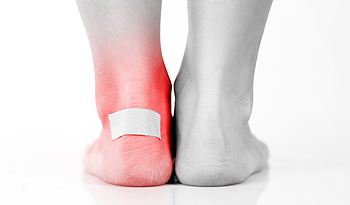 People who often get blisters on the feet are aware of the discomfort they may cause. Blisters are a small area that can resemble a bubble that forms over the damaged skin. This is filled with fluid that protects the raw skin, and will gradually drain when the healing process is completed. There are several reasons why blisters on the feet can develop, including wearing shoes that do not fit properly, excessive sweating that may come from wearing shoes that are made of non-breathable materials, or from not wearing socks. Research has indicated that it may be beneficial to moisturize the feet prior to wearing shoes. This may help prevent existing blisters from becoming worse. If you get frequent blisters on the feet, it is suggested that you consult with a podiatrist who can guide you toward effective prevention and treatment techniques.
People who often get blisters on the feet are aware of the discomfort they may cause. Blisters are a small area that can resemble a bubble that forms over the damaged skin. This is filled with fluid that protects the raw skin, and will gradually drain when the healing process is completed. There are several reasons why blisters on the feet can develop, including wearing shoes that do not fit properly, excessive sweating that may come from wearing shoes that are made of non-breathable materials, or from not wearing socks. Research has indicated that it may be beneficial to moisturize the feet prior to wearing shoes. This may help prevent existing blisters from becoming worse. If you get frequent blisters on the feet, it is suggested that you consult with a podiatrist who can guide you toward effective prevention and treatment techniques.
Blisters are prone to making everyday activities extremely uncomfortable. If your feet are hurting, contact Dr. Kenneth Donovan of Advanced Care Foot and Ankle. Our doctor can provide the care you need to keep you pain-free and on your feet.
Foot Blisters
Foot blisters develop as a result of constantly wearing tight or ill-fitting footwear. This happens due to the constant rubbing from the shoe, which can often lead to pain.
What Are Foot Blisters?
A foot blister is a small fluid-filled pocket that forms on the upper-most layer of the skin. Blisters are filled with clear fluid and can lead to blood drainage or pus if the area becomes infected.
How Do Blisters Form?
Blisters on the feet are often the result of constant friction of skin and material, usually by shoe rubbing. Walking in sandals, boots, or shoes that don’t fit properly for long periods of time can result in a blister. Having consistent foot moisture and humidity can easily lead to blister formation.
Prevention & Treatment
It is important to properly care for the affected area in order to prevent infection and ease the pain. Do not lance the blister and use a Band-Aid to provide pain relief. Also, be sure to keep your feet dry and wear proper fitting shoes. If you see blood or pus in a blister, seek assistance from a podiatrist.
If you have any questions, please feel free to contact one of our offices located in Warren, Livingston, and Toms River, NJ . We offer the newest diagnostic and treatment technologies for all your foot care needs.
It’s Time for Beautiful Feet
It's Time for Beautiful Feet
Exercise Can Benefit Patients With Peripheral Neuropathy
Peripheral neuropathy, which can cause weakness, numbness, and pain in your feet, might make you reluctant to exercise. However, there is scientific evidence that you can benefit from physical activity. Researchers have found that exercising can improve balance, strength, and walking speed, reduce neuropathic pain and sensory disturbances, and improve mobility and confidence in patients with peripheral neuropathy. Doctors recommend that patients with peripheral neuropathy engage in flexibility, endurance, strength, and balance exercises to get maximum results. A podiatrist can help you maintain an active and healthy lifestyle by providing treatments to slow the progression of the disease, decrease your pain, and maintain the health of your feet.
Neuropathy
Neuropathy can be a potentially serious condition, especially if it is left undiagnosed. If you have any concerns that you may be experiencing nerve loss in your feet, consult with Dr. Kenneth Donovan from Advanced Care Foot and Ankle. Our doctor will assess your condition and provide you with quality foot and ankle treatment for neuropathy.
What Is Neuropathy?
Neuropathy is a condition that leads to damage to the nerves in the body. Peripheral neuropathy, or neuropathy that affects your peripheral nervous system, usually occurs in the feet. Neuropathy can be triggered by a number of different causes. Such causes include diabetes, infections, cancers, disorders, and toxic substances.
Symptoms of Neuropathy Include:
- Numbness
- Sensation loss
- Prickling and tingling sensations
- Throbbing, freezing, burning pains
- Muscle weakness
Those with diabetes are at serious risk due to being unable to feel an ulcer on their feet. Diabetics usually also suffer from poor blood circulation. This can lead to the wound not healing, infections occurring, and the limb may have to be amputated.
Treatment
To treat neuropathy in the foot, podiatrists will first diagnose the cause of the neuropathy. Figuring out the underlying cause of the neuropathy will allow the podiatrist to prescribe the best treatment, whether it be caused by diabetes, toxic substance exposure, infection, etc. If the nerve has not died, then it’s possible that sensation may be able to return to the foot.
Pain medication may be issued for pain. Electrical nerve stimulation can be used to stimulate nerves. If the neuropathy is caused from pressure on the nerves, then surgery may be necessary.
If you have any questions, please feel free to contact one of our offices located in Warren, Livingston, and Toms River, NJ . We offer the newest diagnostic and treatment technologies for all your foot care needs.
Exercise Can Benefit Patients With Peripheral Neuropathy
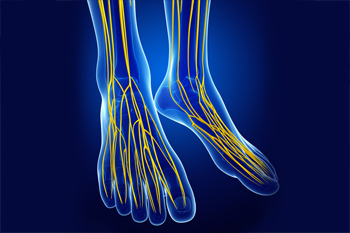 Peripheral neuropathy, which can cause weakness, numbness, and pain in your feet, might make you reluctant to exercise. However, there is scientific evidence that you can benefit from physical activity. Researchers have found that exercising can improve balance, strength, and walking speed, reduce neuropathic pain and sensory disturbances, and improve mobility and confidence in patients with peripheral neuropathy. Doctors recommend that patients with peripheral neuropathy engage in flexibility, endurance, strength, and balance exercises to get maximum results. A podiatrist can help you maintain an active and healthy lifestyle by providing treatments to slow the progression of the disease, decrease your pain, and maintain the health of your feet.
Peripheral neuropathy, which can cause weakness, numbness, and pain in your feet, might make you reluctant to exercise. However, there is scientific evidence that you can benefit from physical activity. Researchers have found that exercising can improve balance, strength, and walking speed, reduce neuropathic pain and sensory disturbances, and improve mobility and confidence in patients with peripheral neuropathy. Doctors recommend that patients with peripheral neuropathy engage in flexibility, endurance, strength, and balance exercises to get maximum results. A podiatrist can help you maintain an active and healthy lifestyle by providing treatments to slow the progression of the disease, decrease your pain, and maintain the health of your feet.
Neuropathy
Neuropathy can be a potentially serious condition, especially if it is left undiagnosed. If you have any concerns that you may be experiencing nerve loss in your feet, consult with Dr. Kenneth Donovan from Advanced Care Foot and Ankle. Our doctor will assess your condition and provide you with quality foot and ankle treatment for neuropathy.
What Is Neuropathy?
Neuropathy is a condition that leads to damage to the nerves in the body. Peripheral neuropathy, or neuropathy that affects your peripheral nervous system, usually occurs in the feet. Neuropathy can be triggered by a number of different causes. Such causes include diabetes, infections, cancers, disorders, and toxic substances.
Symptoms of Neuropathy Include:
- Numbness
- Sensation loss
- Prickling and tingling sensations
- Throbbing, freezing, burning pains
- Muscle weakness
Those with diabetes are at serious risk due to being unable to feel an ulcer on their feet. Diabetics usually also suffer from poor blood circulation. This can lead to the wound not healing, infections occurring, and the limb may have to be amputated.
Treatment
To treat neuropathy in the foot, podiatrists will first diagnose the cause of the neuropathy. Figuring out the underlying cause of the neuropathy will allow the podiatrist to prescribe the best treatment, whether it be caused by diabetes, toxic substance exposure, infection, etc. If the nerve has not died, then it’s possible that sensation may be able to return to the foot.
Pain medication may be issued for pain. Electrical nerve stimulation can be used to stimulate nerves. If the neuropathy is caused from pressure on the nerves, then surgery may be necessary.
If you have any questions, please feel free to contact one of our offices located in Warren, Livingston, and Toms River, NJ . We offer the newest diagnostic and treatment technologies for all your foot care needs.
